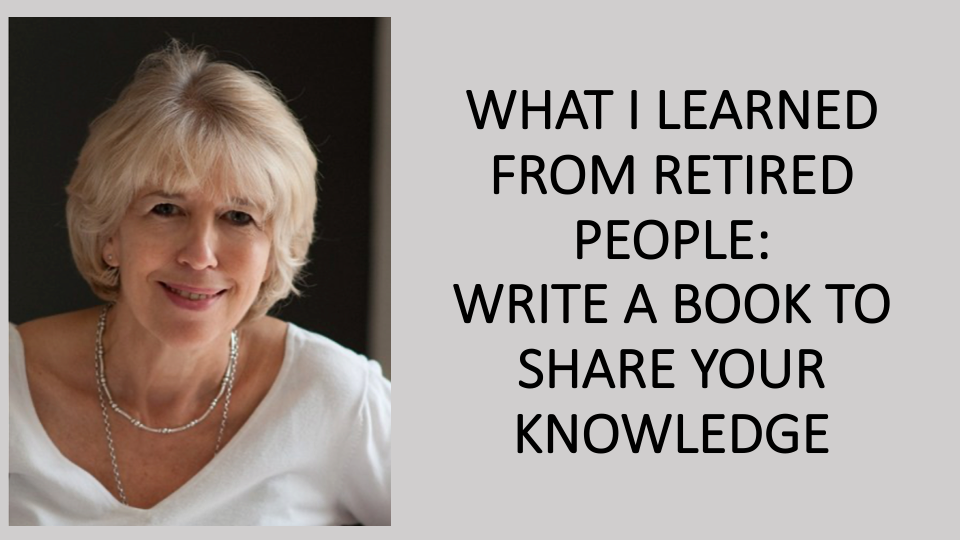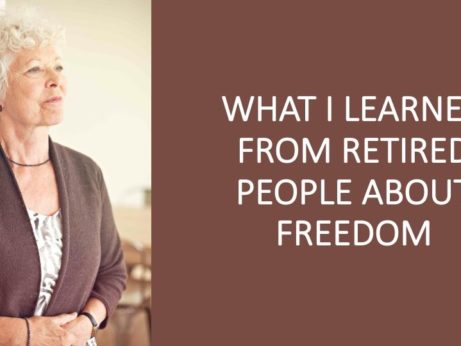What I Learned From Talking to Retired People: Write a Book to Share Your Knowledge

If you are thinking of writing a book to share your knowledge and experience, but unsure if to go for it? This article will give you insights on what it takes to write a book, how to get going, and how to stay motivated when writing it.
Jane Hooper wrote her book in the third phase of her life. The book is called The Story of Confidence.
Why writing a book on confidence? The topic came from her extensive experience as a trainer: It didn’t matter what the training was about, people always wanted to have more confidence.
She discovered that the level of confidence was changing based on the situation, but also during major life transitions. In some situations (e.g. with our friends) we are very confident and in other situations (e.g. public speaking) we might be less confident. Life transitions and changes are also moments when we can feel less confident: e.g. starting a new school or retirement.
Jane came to one of the interactive workshops “What I learned from talking to retired people” and shared her journey. These are the key things that I noted down:
🔘 KNOW WHY YOU WANT TO WRITE A BOOK AND FOR WHOM
- Is it a legacy for your kids & grandkids? Is it because you love writing? Is it for your clients as a support for workshops and coaching? There is a lot of uncertainty when writing and publishing a book, maybe not many people will buy it, and knowing your own purpose (why you want to write a book) helps you stay motivated.
- When you know your audience, it will help you connect with your audience when you write the book, but also when you promote your book.
🔘 FEEDBACK WILL HELP YOU GET THROUGH THE MOMENTS OF DOUBTS
There will be moments of doubts, low confidence, or moments when you will not know how to move forward. Jane highlighted how feedback was important to get going with more clarity and confidence. She mentioned three sources for the feedback:
- Mentor: an experienced writer who has been through the process and can help you when you keep your feet on the ground and give you tips when you get stuck in the process of writing, publishing, and promoting your book.
- Test readers: a circle of people who can give honest feedback about the content – is it clear, is it too much or too little?
- Your audience: Jane asked 100 people to fill in a quiz on confidence that served as a basis for follow-up interviews. Talking to her target audience helped her build the whole concept of 5 confidence types and validate that she was going in the right direction. If you’re writing a children’s book, get some kids to read your book, see how they interact with it.
🔘 WRITING A BOOK IS A MESSY CREATIVE PROCESS
- You don’t need to have everything figured out: all the answers will come on the way.
- In the beginning, Jane only knew her topic: confidence. She started writing her own story on how she felt very confident in one situation, but not confident in another one. After that, she got an idea to do research using her quiz and interviews. And only after that, she figured out the structure and the whole concept of five confidence personas.
- Jane recommends this process when writing your book:
- Decide who your readers are.
- Think about what your objectives are for yourself and your readers.
- Research your topic.
- Work out the best structure for your message and readers.
- Find a Mentor who has gone through this process (there are lots of them!)
- Have a small group of people with different strengths i.e. understanding of audience, expertise in the subject, writing skills, grammar, etc to give feedback as you progress.
- Use a professional editor they are worth their weight in gold for finding flaws both in layout, content, and grammar.
- Use a technical expert related to cover design and publication.
- Act on feedback.
Overall, writing a book is an exciting learning journey! A journey that stimulates mind and soul. Something to experience in life at least once!
During the workshop, we had an amazing exchange and I’ve noted down a couple of points that came out from different people who were present.
- Writing a book can be hard work. You really need to feel a strong inner desire to write a book and go through all the struggles. It’s a learning journey that is not always easy.
- Pick a circle of people who will be your advisors and mentors and stick with them. Gather feedback on the way and don’t keep gathering feedback and rewriting the content. It’s a very frustrating process.
- Think about publishing relatively early in the process. If you have a publisher, run the title and content with the publisher to make sure that you are going in the right direction. If you want to self-publish, create a promotional strategy and engage with the audience as you write the book.
- Your writing style is changing, your values are changing, even your opinions are changing. And it’s ok! But don’t try to rewrite your book because of this. The biggest enemy is perfectionism and doubts. If you have an idea, just stick with it and enjoy writing the book.
- Even if you write a book based on research – don’t get bogged down by the science and avoid going deep into areas that you are not an expert in. Your book is about your own experience and your own research. There is no need to justify every point you want to make.
Ready to write a book? My impression is that writing a book is an exciting learning journey! A journey that stimulates mind and soul. Something to experience in life at least once!



